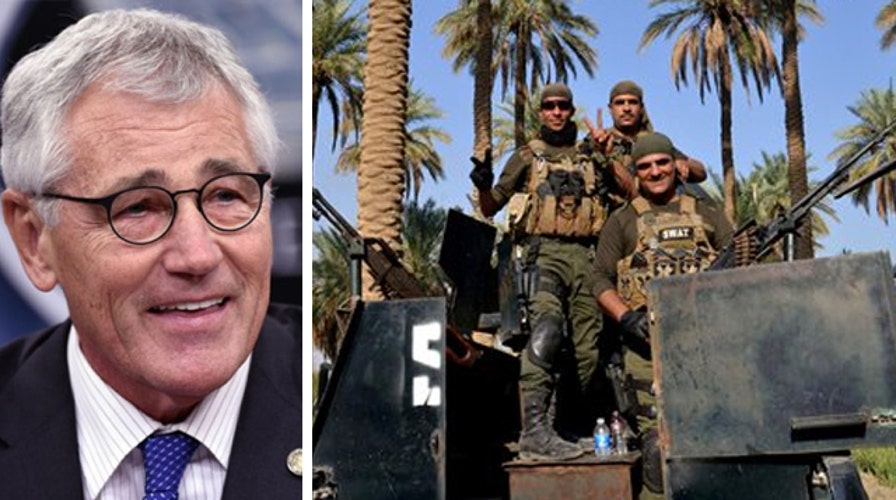Secretary Hagel: US to speed up training of Iraqi forces
Reaction from former US Army Lt. Gen. Daniel Bolger
Defense Secretary Chuck Hagel said Sunday that the U.S. military is speeding up its training and advising of Iraqi forces who are fighting the Islamic State militants after a recommendation from the commander of U.S. Central Command.
Hagel's announcement came the same day the White House confirmed a third American, aid worker and former Army Ranger Peter Kassig, had been beheaded by members of the militant group.
The Pentagon chief spoke to reporters after observing Army training in California's Mojave Desert on Sunday. He said U.S. special operations troops in Iraq's western Anbar province are getting an early start on the train-and-advise effort.
Hagel said the effort began a few days ago but did not provide any other details.
According to plans laid out last week, the U.S. expects to train nine Iraqi security forces brigades and three Kurdish Peshmerga brigades. Hagel said the speed-up was recommended by Gen. Lloyd Austin, the commander of U.S. Central Command.
Hagel's spokesman, Navy Rear Adm. John Kirby, said later that Austin believes getting an early start on training Iraqi forces in Anbar may prompt other countries with a stake in the fight against Islamic State to commit trainers to Iraq.
Approaching the problem of ill-trained and poorly motivated Iraqi soldiers as a coalition rather than as a unilateral U.S. undertaking is a key pillar of U.S. strategy. Partnership is seen as a way of undermining the ideological appeal of Islamic State.
Kirby said a number of countries have made verbal commitments to provide trainers, but he said he could not identify them because they have yet to publicly announce their intended contributions.
On Thursday, Hagel told Congress that the U.S. and coalition forces are making progress in the fight against the militant group, also known as ISIS of ISIL, but the American people must prepare for a long and difficult struggle.
"ISIL's advance in parts of Iraq has stalled, and in some cases been reversed, by Iraqi, Kurdish, and tribal forces supported by U.S. and coalition airstrikes," Hagel said in testimony to the House Armed Services Committee. "But ISIL continues to represent a serious threat to American interests, our allies, and the Middle East ... and wields influence over a broad swath of territory in western and northern Iraq and eastern Syria."
The testimony of Hagel and Army Gen. Martin Dempsey, the chairman of the Joint Chiefs of Staff, came just days after President Barack Obama asked Congress for a new $5.6 billion plan to expand the U.S. mission in Iraq and send up to 1,500 more American troops to the war-torn nation.
Kassig is the fifth Western hostage killed by ISIS in less than three months, and the third American. Previous Western beheading victims were American journalists James Foley and Steven Sotloff, as well as Britons David Haines, a former Royal Air Force engineer, and Alan Henning, a taxi driver from northwest England. The group is also holding British photojournalist John Cantlie, who has appeared in several other videos released by the group functioning as a de facto spokesman.
The group has declared a self-styled Islamic caliphate in areas under its control, which it governs according to its violent interpretation of Shariah law, including massacring rebellious tribes and selling women and children of religious minorities into slavery.
The group's militants have also beheaded and shot dead hundreds of captives, mostly Syrian and Iraqi soldiers, during its sweep across the two countries, and has celebrated its mass killings in extremely graphic videos.
The Islamic State group has its roots in Al Qaeda's Iraqi affiliate but was expelled from the global terror network over its brutal tactics and refusal to obey orders to confine its activities to Iraq. It became even more extreme amid the bloody civil war in neighboring Syria and grew strong enough to launch a lightning offensive across Iraq.
Syria's war began as an uprising against President Bashar Assad. Activists say that conflict has killed more than 200,000 people.
The Associated Press contributed to this report.





